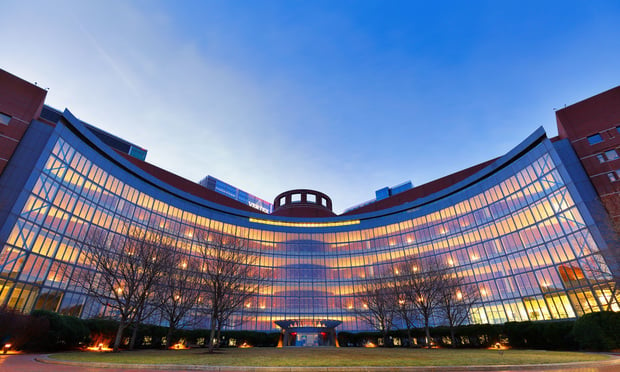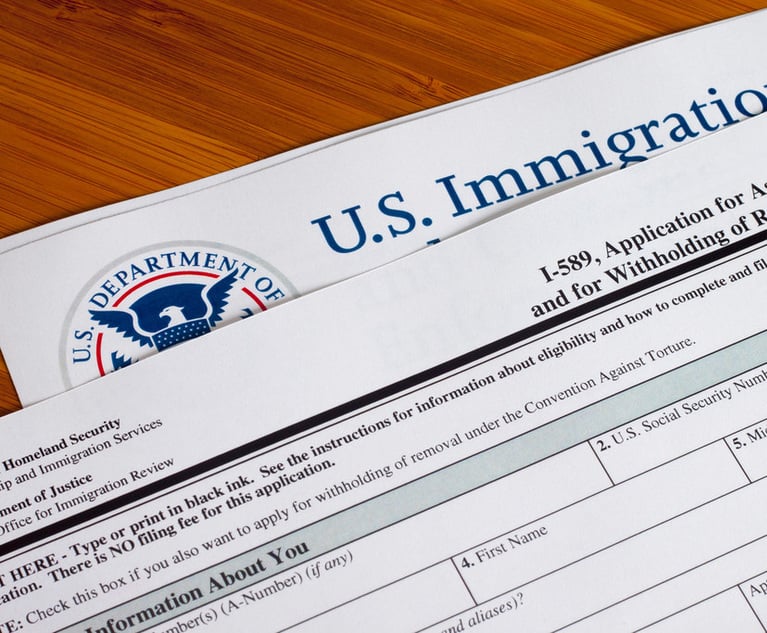Judge Grants Class Certification to Detainees Suing ICE Over COVID-19 Fears
A federal judge in Boston has granted class certification to 148 civil immigration detainees in that state. That class certification will allow the judge to release the detainees in bulk, as opposed to on an individual basis.
April 09, 2020 at 01:29 PM
3 minute read
 John Joseph Moakley U.S. Courthouse in Boston. Photo: Jay Yuan/Shutterstock.com
John Joseph Moakley U.S. Courthouse in Boston. Photo: Jay Yuan/Shutterstock.com
The case of 148 civil immigration detainees reached the court at a "grim moment" during the COVID-19 pandemic, according to a federal judge in Boston, who granted class certification to plaintiffs suing the U.S. Immigration and Customs Enforcement agency.
Class certification in Savino v. Superintendent of Bristol County House of Corrections means that plaintiffs attorneys can submit requests to release the detainees collectively, as opposed to on an individual basis.
The petitioners are civil immigration detainees "who say they are held in tight quarters and unable to keep safe distances from others who may, and, with time, inevitably will, carry the highly contagious virus," according to Judge William Young's 29-page memorandum and order issued Wednesday.
Representing the defendants are Thomas Kanwit and Michael Sady of the U.S. Attorney's Office in Boston. Neither responded to a request for comment Thursday, but ICE could appeal to the First Circuit Court of Appeals in Boston.
Meanwhile, Young has released 18 of the detainees. His new ruling could see him release more detainees in bulk, according to Oren Nimni, an attorney for Lawyers for Civil Rights in Boston.
Nimni, one of the plaintiffs' attorneys, Thursday said his group will continue to provide the judge with 10 briefs per day, which will include the names of 10 detainees.
"The judge's ruling allows him to look at detainees collectively, and not have a bunch of lawyers filing individual cases for their clients," he said.
Nimni said Young is expected to make an announcement by the end of the day Thursday about releasing more plaintiffs.
"These detainees are in extremely dangerous conditions," the attorney said. "This facility in particular in North Dartmouth has a lack of hygiene. It has broken showers and sinks. There is no access to soap and cleaning supplies. They do not have the ability to socially distance."
The detainees, Nimni said, are not in detention for criminal matters, but for civil cases.
"They all violated some part of the civil code that regulates immigration," he said. "It could be for overstaying their visa or something like being in the country without status."
In his ruling, Young noted the detainees "allege that their beds are situated only three-feet apart and that meals are inadequate and eaten in close quarters. Indeed, the government has provided the court with photos of the sleeping quarters in the facility and this appears to be an inaccurate description."
Joining Lawyers for Civil Rights in representing the plaintiffs are The Lawyers Committee for Civil Rights and Economic Justice and members from the Workers and Immigration Rights Advocacy Clinic at Yale Law School.
Read more:
NOT FOR REPRINT
© 2025 ALM Global, LLC, All Rights Reserved. Request academic re-use from www.copyright.com. All other uses, submit a request to [email protected]. For more information visit Asset & Logo Licensing.
You Might Like
View All
Trump Administration Faces Legal Challenge Over EO Impacting Federal Workers
3 minute read
Settlement Allows Spouses of U.S. Citizens to Reopen Removal Proceedings
4 minute read
Trending Stories
- 1Day Pitney Announces Partner Elevations
- 2The New Rules of AI: Part 2—Designing and Implementing Governance Programs
- 3Plaintiffs Attorneys Awarded $113K on $1 Judgment in Noise Ordinance Dispute
- 4As Litigation Finance Industry Matures, Links With Insurance Tighten
- 5The Gold Standard: Remembering Judge Jeffrey Alker Meyer
Who Got The Work
J. Brugh Lower of Gibbons has entered an appearance for industrial equipment supplier Devco Corporation in a pending trademark infringement lawsuit. The suit, accusing the defendant of selling knock-off Graco products, was filed Dec. 18 in New Jersey District Court by Rivkin Radler on behalf of Graco Inc. and Graco Minnesota. The case, assigned to U.S. District Judge Zahid N. Quraishi, is 3:24-cv-11294, Graco Inc. et al v. Devco Corporation.
Who Got The Work
Rebecca Maller-Stein and Kent A. Yalowitz of Arnold & Porter Kaye Scholer have entered their appearances for Hanaco Venture Capital and its executives, Lior Prosor and David Frankel, in a pending securities lawsuit. The action, filed on Dec. 24 in New York Southern District Court by Zell, Aron & Co. on behalf of Goldeneye Advisors, accuses the defendants of negligently and fraudulently managing the plaintiff's $1 million investment. The case, assigned to U.S. District Judge Vernon S. Broderick, is 1:24-cv-09918, Goldeneye Advisors, LLC v. Hanaco Venture Capital, Ltd. et al.
Who Got The Work
Attorneys from A&O Shearman has stepped in as defense counsel for Toronto-Dominion Bank and other defendants in a pending securities class action. The suit, filed Dec. 11 in New York Southern District Court by Bleichmar Fonti & Auld, accuses the defendants of concealing the bank's 'pervasive' deficiencies in regards to its compliance with the Bank Secrecy Act and the quality of its anti-money laundering controls. The case, assigned to U.S. District Judge Arun Subramanian, is 1:24-cv-09445, Gonzalez v. The Toronto-Dominion Bank et al.
Who Got The Work
Crown Castle International, a Pennsylvania company providing shared communications infrastructure, has turned to Luke D. Wolf of Gordon Rees Scully Mansukhani to fend off a pending breach-of-contract lawsuit. The court action, filed Nov. 25 in Michigan Eastern District Court by Hooper Hathaway PC on behalf of The Town Residences LLC, accuses Crown Castle of failing to transfer approximately $30,000 in utility payments from T-Mobile in breach of a roof-top lease and assignment agreement. The case, assigned to U.S. District Judge Susan K. Declercq, is 2:24-cv-13131, The Town Residences LLC v. T-Mobile US, Inc. et al.
Who Got The Work
Wilfred P. Coronato and Daniel M. Schwartz of McCarter & English have stepped in as defense counsel to Electrolux Home Products Inc. in a pending product liability lawsuit. The court action, filed Nov. 26 in New York Eastern District Court by Poulos Lopiccolo PC and Nagel Rice LLP on behalf of David Stern, alleges that the defendant's refrigerators’ drawers and shelving repeatedly break and fall apart within months after purchase. The case, assigned to U.S. District Judge Joan M. Azrack, is 2:24-cv-08204, Stern v. Electrolux Home Products, Inc.
Featured Firms
Law Offices of Gary Martin Hays & Associates, P.C.
(470) 294-1674
Law Offices of Mark E. Salomone
(857) 444-6468
Smith & Hassler
(713) 739-1250











